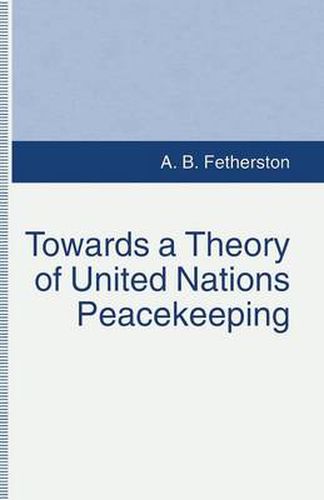Readings Newsletter
Become a Readings Member to make your shopping experience even easier.
Sign in or sign up for free!
You’re not far away from qualifying for FREE standard shipping within Australia
You’ve qualified for FREE standard shipping within Australia
The cart is loading…






This title is printed to order. This book may have been self-published. If so, we cannot guarantee the quality of the content. In the main most books will have gone through the editing process however some may not. We therefore suggest that you be aware of this before ordering this book. If in doubt check either the author or publisher’s details as we are unable to accept any returns unless they are faulty. Please contact us if you have any questions.
‘At a time when peacekeepers are struggling to fulfil increasingly demanding mandates and UN peacekeeping is in danger of losing the distinct character that won it the 1988 Nobel Peace Prize, this important book argues for a clear theoretical redefinition within a conflict resolution framework and examines the practical implications for training. This is a valuable and original contribution to the peacekeeping literature.’ - Dr. Oliver Ramsbotham, Department of Peace Studies, University of Bradford ‘Both for the 'blue helmets’ on the ground, and for the diplomats at UN headquarters, conflict resolution skills are essential for conducting peacekeeping operations. Betts Fetherstone’s excellent study points the way forward to a synthesis between conflict management and peacekeeping?‘ - Hugh Miall, Research Fellow, European Programme, Royal Institute of International Affairs The prevailing over-taxed ad hoc system of peacekeeping does not meet the growing demands posed by the post-Cold War world. This volume argues that peacekeeping needs to be placed on firm conceptual footing directly congruent with its peaceful third party role. The implications of this conceptualisation of peacekeeping for practice are then discussed. Training is cited as a key means of translating conceptual understanding into practice. Without this foundation work, UN has little chance of changing its existing, and largely ineffective, system of conflict management. At a time when peacekeepers are struggling to fulfil increasingly demanding mandates and UN peacekeeping is in danger of losing the distinct character that won it the 1988 Nobel Peace Prize, this important book argues for a clear theoretical redefinition within a conflict resolution framework and examines the practical implications for training. This is a valuable and original contribution to the peacekeeping literature.
$9.00 standard shipping within Australia
FREE standard shipping within Australia for orders over $100.00
Express & International shipping calculated at checkout
Stock availability can be subject to change without notice. We recommend calling the shop or contacting our online team to check availability of low stock items. Please see our Shopping Online page for more details.
This title is printed to order. This book may have been self-published. If so, we cannot guarantee the quality of the content. In the main most books will have gone through the editing process however some may not. We therefore suggest that you be aware of this before ordering this book. If in doubt check either the author or publisher’s details as we are unable to accept any returns unless they are faulty. Please contact us if you have any questions.
‘At a time when peacekeepers are struggling to fulfil increasingly demanding mandates and UN peacekeeping is in danger of losing the distinct character that won it the 1988 Nobel Peace Prize, this important book argues for a clear theoretical redefinition within a conflict resolution framework and examines the practical implications for training. This is a valuable and original contribution to the peacekeeping literature.’ - Dr. Oliver Ramsbotham, Department of Peace Studies, University of Bradford ‘Both for the 'blue helmets’ on the ground, and for the diplomats at UN headquarters, conflict resolution skills are essential for conducting peacekeeping operations. Betts Fetherstone’s excellent study points the way forward to a synthesis between conflict management and peacekeeping?‘ - Hugh Miall, Research Fellow, European Programme, Royal Institute of International Affairs The prevailing over-taxed ad hoc system of peacekeeping does not meet the growing demands posed by the post-Cold War world. This volume argues that peacekeeping needs to be placed on firm conceptual footing directly congruent with its peaceful third party role. The implications of this conceptualisation of peacekeeping for practice are then discussed. Training is cited as a key means of translating conceptual understanding into practice. Without this foundation work, UN has little chance of changing its existing, and largely ineffective, system of conflict management. At a time when peacekeepers are struggling to fulfil increasingly demanding mandates and UN peacekeeping is in danger of losing the distinct character that won it the 1988 Nobel Peace Prize, this important book argues for a clear theoretical redefinition within a conflict resolution framework and examines the practical implications for training. This is a valuable and original contribution to the peacekeeping literature.